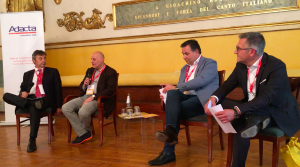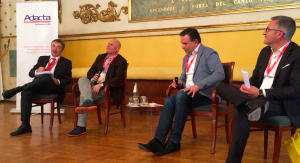Every year in Padua, Italy, the university of Padua, one of the oldest in the world, organizes the Galileo Innovation Festival. Intelligent Management was delighted to be invited by Adacta Innovation Lab to speak this year at the historical Caffè Pedrocchi together with Stefano Righetti, CEO of Hyphen-Italia and Patrizio Bof, CEO of Infinite Area. In this post we’ve translated into English Domenico Lepore‘s response to questions about innovation, management and method.
Work and Complexity
I come from a scientific background so where better than the Galileo Festival to speak about Innovation. For some years now organizations have been experiencing a dichotomy that seems unsolvable: a crystallized reality governed through silos and based on a of local optima whereas the natural way for organizations to function is based on flow. This reflects a dichotomy that has affected the world for several centuries. A world of interactions and contaminations starts with the Renaissance and the “imperialism” of science worldview that starts with Newton and that in a very reductionist and mechanical way sees reality as a set of separate parts that work together.
Today we live with what we now call complexity and we need to know how to understand and embrace it, understand the intrinsic nonlinearities and surface the deep assumptions that underpin the duality between functional hierarchical models and models that are more based on the interdependencies that typify complexity.
Important work was done in previous decades regarding how organizations function that has its roots in Quality and statistical studies and more recently the Theory of Constraints that focuses on leveraging the constraint of an organization. These approaches stress the importance of creating a fast flow to satisfy market demands and they also provide alternative ways to exercise control and monitor the way that work develops.
The methodology that we’ve been working with for almost 20 years both in Europe and North America called The Decalogue is entirely based on resolving the conflict between functional hierarchies versus an interdependence-based way of working. Of fundamental importance are the aspects of how do we control an organization and how do we design careers and personal development within a structure that is not vertical.
New skills for the future
There are many young people in the audience here today who are probably new to the world of work or about to enter into it. Unfortunately, the skills that you will need in order to be equipped for a rapidly evolving workplace are not taught in universities that are themselves organized into silos and where different areas of knowledge are kept separate. Perhaps not everywhere but generally speaking, you won’t see a holistic, systemic approach in education that brings the various areas of knowledge together. A real revolution will take place when eventually schools and academic institutions realize that they must teach not just subject matters but also how these subjects matters are connected.
What are the factors that limit our ability to innovate? Certainly, the way companies are structured into silos impedes contamination. This is true not just inside companies but among companies. Even though everybody talks about networks, collaboration and supply chains, companies are still focused on their own assets and their own local optimum. It’s all part of a zero-sum game mentality. If we want to overcome these limitations and open ourselves up to innovation, yes, it’s important to have a meeting place and technology can be helpful. But what really limits us is the fact that our world is structured in a certain way through the way we speak and the way we think. What’s required is a cognitive leap and we can take that leap by using an ability that only humans have to connect elements of our prefrontal cortex that have to do with intuition, analyze and make happen. There’s a way to do this that is structured, a thought technology, if you like, that can improve our ability to think our future.
Young people today have to cope with the problem that we’ve lost our points of reference and our certainties. Not only is our world now digital, it’s also decentralized. As humans we do need structure and this structure is increasingly less physical, so we need be able to think about coming together not so much in a physical space but inside a network of interdependencies. This happens through language – it’s a network of conversations. Ina decentralized world we can’t abandon the idea of connection and interdependence so what becomes of fundamental importance is the building of structured ways to collaborate. Platforms like Facebook completely fail to provide the means to work together in a structured way. They allow you to organize a party, perhaps, but not to actually build something.
Digitalized and decentralized
We need methods to guide our interactions and to direct networks. Our world is increasingly becoming a network of networks and these networks need to be directed towards the achievement of specific goals. That can’t happen spontaneously because entropy exists. How do we direct a network? Through language, through a network of conversations. Technology can help us with this when it serves to direct a network of conversations, when it helps people with ideas who are trying to achieve goals to work together in a way that is decentralized and secure. Blockchain technology for instance. If projects are managed in a competent way then people who cannot connect in a physical space can still build things together. This is especially important today when young people start jobs not thinking that they have to be “faithful” to one employer for 40 years and then retire but fully aware that they have their own personal brand, their own intrinsic motivations about work and success. Organizations can’t be successful any more unless they take this aspect of personal brand into consideration. In fact, the idea of personal brand works perfectly in the context of a directed network and a project-based organization. This kind of organization overcomes all the limitations that derive from a traditional functional/hierarchical structure.
What we’re looking at is directed networks made up of competencies and they don’t need a physical space but a mental space where coordination is supported by technology. So the company of the future that is digitalized and decentralized is one where people participate and contribute on the basis of their competencies and inclinations with ‘organized freedom’. This destructured work isn’t anarchy. If you like, it’s structured destructuring that allows people to be themselves. We’re going towards a world that is less about doing and more about being. Our knowledge will be an expression of who we are. And the value that this knowledge will produce will be in direct proportion to how well it can be coordinated with others in a decentralized but organized way.
Click image below to hear Part One (in Italian)
Click image below to hear Part Two (in Italian)
Sign up to our blog here and shift your thinking towards broader, systemic possibilities for yourself and your organization.
About the Author
Angela Montgomery Ph.D. is Partner and Co-founder of Intelligent Management and author of the business novel+ website The Human Constraint . This downloadable novel uses narrative to look at how the Deming approach and the Theory of Constraints can create the organization of the future, based on collaboration, network and social innovation. She is co-author with Dr. Domenico Lepore, founder, and Dr. Giovanni Siepe of ‘Quality, Involvement, Flow: The Systemic Organization’ from CRC Press, New York.








Leave a Reply